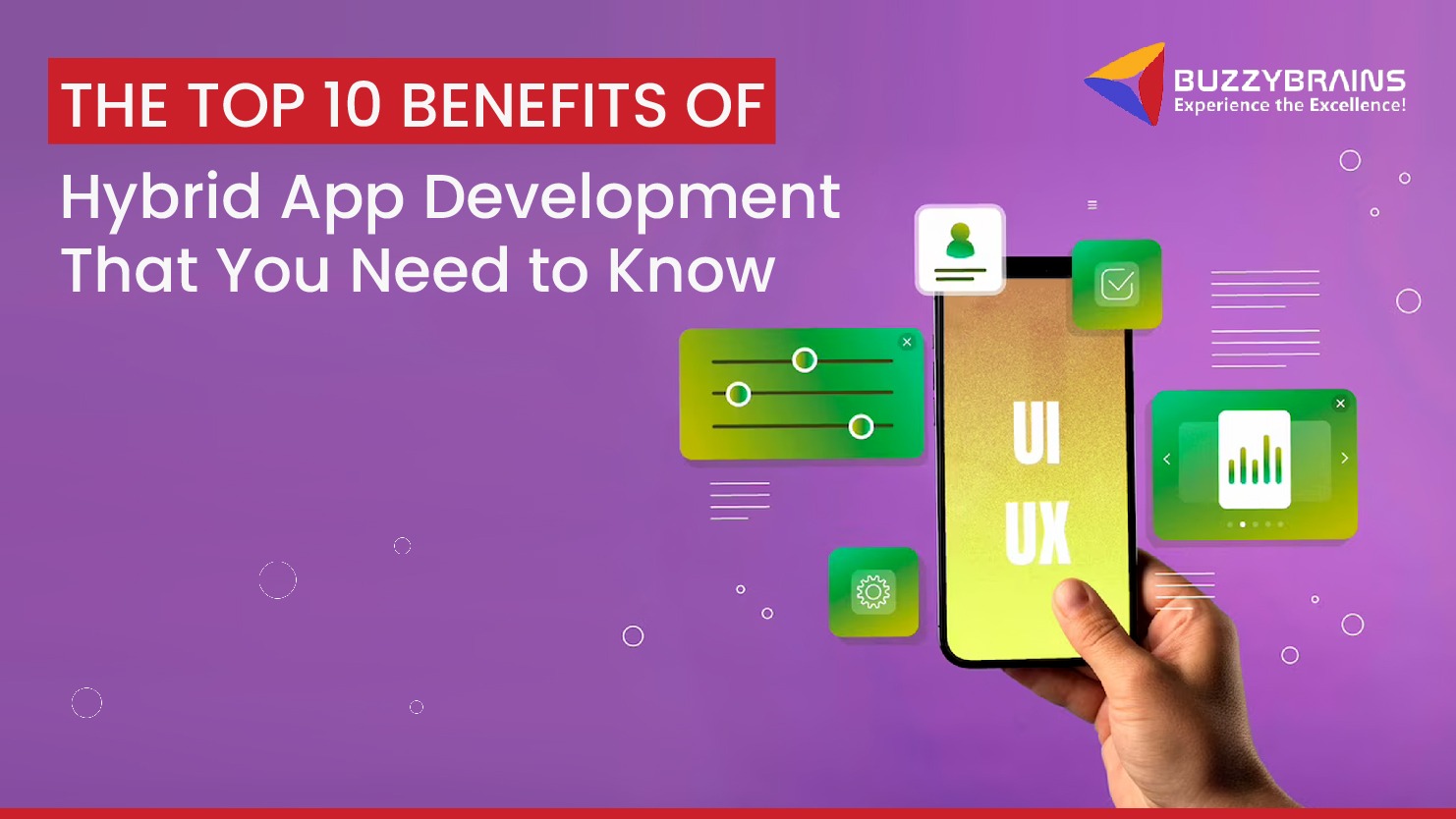The Top 10 Benefits of Hybrid App Development That You Need to Know

What Are Hybrid Apps?
When we think of app development, our first thought always inclines toward iOS or Android. However, there is a viable third option known as a hybrid app. In simple words, we can understand hybrid apps as software that supports multiple platforms. They combine elements of both native and web applications and are essentially web apps with a native app shell.
Once downloaded and locally installed the shell of hybrid apps connects to whatever capabilities the mobile platform provides through a browser that is embedded in the application. The browser and its plug-ins run on the back end and are invisible to the end user. Hybrid applications are incredibly popular, as they enable developers to write code for a mobile app once and still accommodate it to multiple platforms. According to recent studies, 74 percent of the top 50 retail applications in the App Store are hybrid applications, which include major brands like Amazon, Walmart, Nike, etc.
What is Hybrid App Development?
To simplify, hybrid app development methodology entails building an application using a framework that can target all needed platforms: Android, iOS, Windows, and more. Except for some elements of the application (the primary one being the UI), which users expect to be customized to their platform of choice, developers only need to write the code once for hybrid applications and then it can be reused when developing the application for any other target platform.
Top 10 Benefits of Hybrid App Development
Hybrid app development is beneficial for businesses, especially start-ups, as they can jump on the mobile market bandwagon on all major platforms simultaneously.
Here are the top 10 benefits of hybrid app development.
1. Cost-efficient
Usually, an up-and-coming business builds an application for one platform, unaware that they might need to run it on diverse platforms later. It is a costly mistake as a separate coding process has to be performed afterward. Thus, the enterprise has to hire developers and research new libraries, APIs, and so forth, all of which are a waste of money, time, and resources.
In such a context, hybrid app development comes to the rescue. Instead of developing different app versions for different platforms, building one ‘hybrid’ app for multiple platforms is cost-effective. The process is, indeed, a savior and blessing for small businesses and start-ups with restrictive budgets.
2. Easy Integration
The second benefit of hybrid app development is that the developer does not have to search for additional specialized libraries of SDKs, APIs, and other tools. To create hybrid applications, the same SDK and API libraries are sufficient. Applications designed using hybrid platforms overcome inflexible circumstances through their simple integration and cross-platform compatibility.
3. Wider Audience
Native or web applications focus on only one platform, meaning that a business is missing out on a large chunk of the profitable user share from other operating systems. In today’s competitive domain, targeting only a single set audience means stunted growth. In such a situation, hybrid app development comes to the rescue. As Android accounts for 73 percent market share and iOS occupies 26 percent globally, the total amounts to 99 percent. So, going hybrid means potentially reaching a wider audience.
4. Better UI/UX
A plethora of resources are available for improving the user interface and experience with hybrid app development. Hybrid applications perform better and faster operations, which improves the user experience. Moreover, as the same set of features and codes are allowed, there is efficiency across all platforms. Lastly, hybrid applications are lightweight and also load materials rapidly.
5. Easy Maintenance
The fifth advantage of hybrid app development is easier maintenance. When different versions of an application are developed for different platforms, the drawback is more resources, money, and time invested in testing the applications. Maintaining one app is a challenge; so, one can imagine how arduous it would be to maintain multiple apps. However, hybrid app development solves the problem with a single codebase. Thus, maintenance is easy, and bringing newer versions and updates is faster.
6. Faster Development
The development process is significantly quicker when compared to native app development, as the hybrid app framework enables mobile app developers to reuse a large proportion of the same. Besides, with the introduction of React Native, Flutter, Ionic, etc. Hybrid app development has become way easier, faster, and more efficient.
7. Enhanced Speed
One of the major reasons for an application’s lethargic performance is a lengthy code. However, hybrid app development frameworks assure better speed, as they are premised on the ethos of less code and reusability. Moreover, they do not depend on network communication, which means they run at a high speed even when the traffic is high. One of the best examples of a hybrid application is Twitter.
8. Saves Time
The most evident benefit of hybrid app development is that it saves a lot of time. As the focus is on a single codebase, no time is wasted on hiring separate developers, researching different libraries and APIs, and maintaining and updating different versions.
9. Improved Offline Support
The penultimate benefit of hybrid app development is excellent offline support. Users who do not have many data plans and a smooth internet connection can also skillfully leverage the offline support of hybrid apps. They do not experience performance problems, crashing, etc.
10. Faster Market Time
Last but not least, as hybrid app development entails developing an application for multiple platforms with a single codebase, the development time is much faster. Thus, the app can be launched at a more rapid rate.
Now that we have touched upon the top 10 benefits of hybrid app development, let us skim through some of its popular frameworks.
Which are the Most Popular Hybrid Mobile App Development Frameworks?
These frameworks enable developers to build applications faster, and more effectively at low costs. Besides, various risks and errors in the job are also reduced.
Some of the most sought-after frameworks for hybrid app development include –
1. React Native
It is an open-source framework created by Facebook to develop apps for Android, Windows, Web, iOS, and more. The features of React Native are –
- It saves money and time
- Better performance
- Enhanced flexibility
- Code reusability
2. Flutter
It is a hybrid framework introduced by Google. Flutter offers an assortment of resources & UI kits so that developers can tailor the app for enhanced speed and performance. The top features of Flutter include –
- The vast scope of creating innovative and stunning user interface
- Faster market time
- Less development time
3. Ionic
It is an open-source framework to develop applications for the platforms like desktop, Android, web, iOS, and more. The features of Ionic include –
- Smooth UI/UX design
- Faster development and testing
- Improved Performance
4. Xamarin
The next framework is Xamarin, which is a free and open-source platform written in C#. The main features of Xamarin include –
- It offers libraries for C++, Java & more.
- Reusable code
- Easy API integration
5. PhoneGap
Last but not least, PhoneGap is another renowned framework for hybrid app development. It is introduced by Adobe Inc, and helps develop mobile apps for Android, Blackberry, iOS, and likewise. The features of PhoneGap include –
- Enhanced UI
- Cost-effective
- Faster development
So, there we have it, a crisp overview of the top five hybrid app development frameworks.
FAQs About Hybrid App Development
Q1. Can hybrid apps perform as well as native apps?
Yes, hybrid apps can perform as well as native apps, offering stellar user experience but at a lower cost. Some of the world’s most popular apps, like Twitter, Amazon, Instagram, etc., are hybrid apps.
Q2. Which programming languages are used in hybrid app development?
The most common programming languages used in hybrid app development are CSS, HTML, and JavaScript.
Q3. Is hybrid app development cost-effective compared to native app development?
Yes, hybrid app development is incredibly cost-effective as they offer cross-platform compatibility. Besides, native app development is the most expensive as you have to build apps for multiple platforms.
Q4. Can a hybrid app be converted to a native app later on?
Yes, it is possible to convert a hybrid app to a native app later on if the binary has the same bundle identifier. You may first release the application with Ionic, Flutter, or another framework and later push a native version of it.
Q5. How does hybrid app development differ from native app development?
The main difference between hybrid app development and native app development is that the former lets the developer write the app functionality in a single codebase, whereas, in native app development, the development team needs to rewrite and redesign all the app functionality in the native development language.
Conclusion
So, there we have it, an extensive overview of the top 10 advantages of hybrid app development. The process serves as a blessing for new businesses dabbling in the mobile market by offering cross-platform compatibility. With benefits like cost-efficiency, faster market time, easy integration, and more, hybrid app development is the future of mobile apps.
BuzzyBrains: Your Solution to Expert Mobile App Development
Ready to take your app to the next level? BuzzyBrains is your go-to partner for exceptional mobile development services. From concept to launch, our team delivers cutting-edge solutions that engage users and drive success. Don’t wait any longer, reach out to us today, and let’s transform your app into a game-changer!
